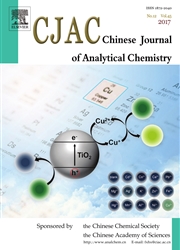

 中文摘要:
中文摘要:
采用苯基硼酸(PBA)衍生化-气相色谱/质谱(GC-MS)联用技术,建立了同时检测植物油中脂肪酸3-氯-1,2-丙二醇酯和脂肪酸2-氯-1,3-丙二醇酯(MCPD酯)的方法。对样品前处理过程中各因素进行了优化,获得了最佳条件,即称取0.1g左右的食用油样品,加入内标后,经0.5mL甲醇钠/甲醇(0.5mol/L)水解1min,中和后用3.0mL正己烷脱脂净化两次;以0.25mL PBA液衍生净化液后,用2.0mL乙酸乙酯萃取衍生物3次,萃取液经氮气吹干后,用0.5mL异辛烷溶解,离心后取上清液用GC-MS测定,内标法定量。在此条件下,样品中MCPD酯响应是德国DGF法响应的15~33倍;杂质相对去除率高达99.1%;有关方法学指标均较为理想。在MCPD酯为25~500ng(以MCPD计)范围内,MCPD与内标峰面积的比值和浓度呈线性相关,相关系数大于0.9990。以花生油为加标基质,在250~1000"g/kg范围内,进行3个水平的重复加标回收实验(n=6),3-MCPD酯和2-MCPD酯的加标回收率分别为81.1%~92.3%和103%~120%;相对标准偏差(RSD)分别为6.3%~12.4%和4.9%~9.4%;检出限分别为76.0和65.0"g/kg。利用本方法测定2011年FAPAS考核样品(棕榈油)中3-MCPD酯的含量,测定值为4.01mg/kg。结果表明,本方法灵敏度高,定量结果准确可靠,从根本上解决了仪器系统容易被污染的问题。
 英文摘要:
英文摘要:
A more desirable method was developed for the determination of fatty acid esters of3-chloropropane-l,2-diol (3-MCPD esters) and 2-chloropropane-1, 3-diol ( 2-MCPD esters ) in vegetable oils. The conditions of hydrolysis, derivatization and extraction of the vegetable oil were optimized. The oil sample added with the isotopic labelled ds-3-MCPD ester and ds-2-MCPD ester was hydrolyzed with 0.50 mL of sodium methoxide (0.50 mol/L) for 1 min. And then the solution was derivatized with 0.25 mL of phenylbroronic acid solution, then the solution was neutralized with 3.0 mL acetic acid and cleaned up with 3. 0 mL of hexane 2 times. The derivatized solution was extracted with 2.0 mL of ethyl acetate 3 times. The extract was dried at nitrogen flow and the residue was dissolved with 0. 5 mL of isooctane, and then detected by gas chromatography-mass spectrometry. Under the optimized conditions, the response of MCPD esters was 15-33 times of that of DGF method and the relative percentage of isooctane's impurities removal was as high as 99. 1% compared with that of ethyl acetate. The method performance was fully validated. Limit of detection (S/N = 3) and quantitation of MCPD ester were 65. 0- 76. 0 gg/kg and 210- 250 μg/kg, respectively. There was an excellent linear correlation between the ratio of the MCPD and its internal standard and the mass (r〉0. 9990) in the range of 25-500 ng of MCPD esters (shown by MCPD). When peanut oils was spiked with MCPD esters at levels of 250-1000 μg/kg (n = 6), average recoveries were 81.4%-104.0% and 103.0%-120.0%, and relative standard deviation (RSD) was 6.3%-12.4% and 4. 9%-9.2%, respectively. An excellent result was obtained with -0. 5 of Z scope when the method was used for 3-MCPD ester proficiency test sponsored by Food Analysis Performance Assessment Scheme. It was concluded that the developed method was much better than DGF method (Deutsche Gesellschaft fur Fettwissenschaft Standard Method( Ⅲ 186 (2009)), especially in sensitivity,
 同期刊论文项目
同期刊论文项目
 同项目期刊论文
同项目期刊论文
 期刊信息
期刊信息
